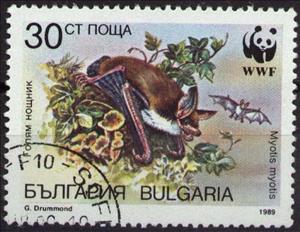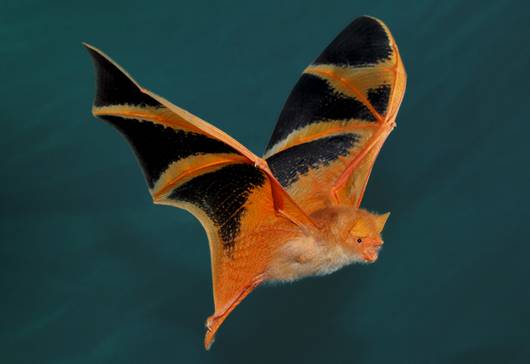Stamp: Greater Mouse-eared Bat (Myotis myotis) (Bulgaria 1989)
Greater Mouse-eared Bat (Myotis myotis) (Bulgaria 1989)
27 February (Bulgaria ) within release Parti-coulered Bat (Vespertilio murinus) goes into circulation Stamp Greater Mouse-eared Bat (Myotis myotis) face value 30 Bulgarian stotinka
| Stamp Greater Mouse-eared Bat (Myotis myotis) in catalogues | |
|---|---|
| Michel: | Mi:BG 3743 |
| Stamp Number: | Sn:BG 3400 |
Stamp is square format.
Also in the issue Parti-coulered Bat (Vespertilio murinus):
- Mini Sheet - Mini Sheet with No. 371-44 - Bats face value 90;
- Stamp - Noctule Bat (Nyctalus noctula) face value 5;
- Stamp - Greater Horseshoe Bat (Rhinolophus ferrumequinum) face value 13;
- Stamp - Greater Mouse-eared Bat (Myotis myotis) face value 30;
- Stamp - Parti-coulered Bat (Vespertilio murinus) face value 42;
Stamp Greater Mouse-eared Bat (Myotis myotis) it reflects the thematic directions:
Bats are flying mammals of the order Chiroptera (/kaɪˈrɒptərə/). With their forelimbs adapted as wings, they are the only mammals capable of true and sustained flight. Bats are more agile in flight than most birds, flying with their very long spread-out digits covered with a thin membrane or patagium. The smallest bat, and arguably the smallest extant mammal, is Kitti's hog-nosed bat, which is 29–34 millimetres (1+1⁄8–1+3⁄8 inches) in length, 150 mm (6 in) across the wings and 2–2.6 g (1⁄16–3⁄32 oz) in mass. The largest bats are the flying foxes, with the giant golden-crowned flying fox (Acerodon jubatus) reaching a weight of 1.6 kg (3+1⁄2 lb) and having a wingspan of 1.7 m (5 ft 7 in).
Animals are multicellular, eukaryotic organisms of the kingdom Animalia (also called Metazoa). All animals are motile, meaning they can move spontaneously and independently, at some point in their lives. Their body plan eventually becomes fixed as they develop, although some undergo a process of metamorphosis later on in their lives. All animals are heterotrophs: they must ingest other organisms or their products for sustenance.


